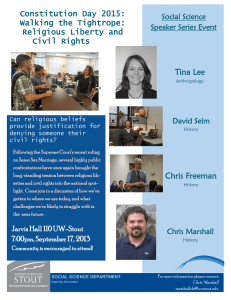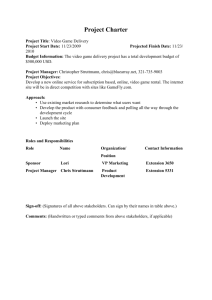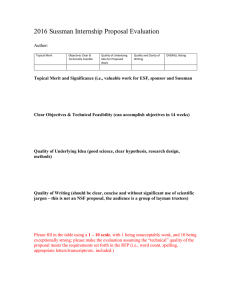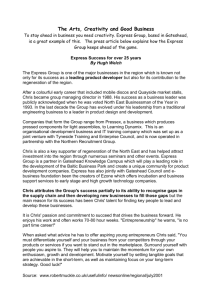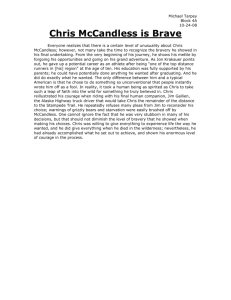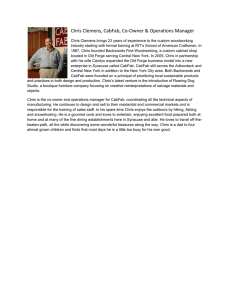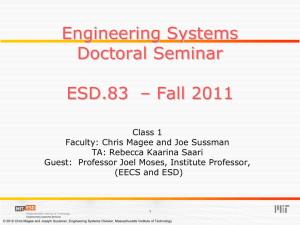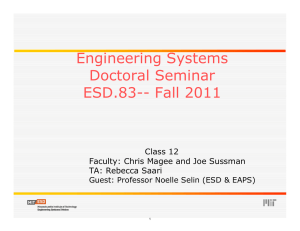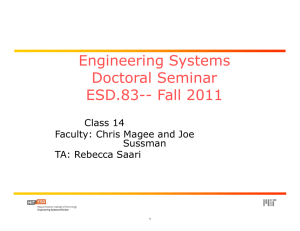Teaching an Engineering Systems Doctoral Seminar: Concepts and Structure
advertisement
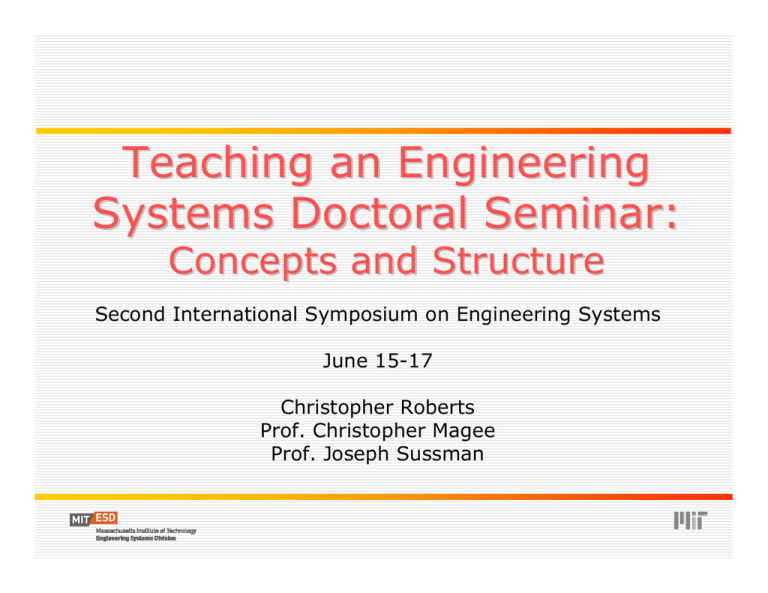
Teaching an Engineering Systems Doctoral Seminar: Concepts and Structure Second International Symposium on Engineering Systems June 15-17 Christopher Roberts Prof. Christopher Magee Prof. Joseph Sussman Background Engineering Systems (ES) is an evolving field spanning engineering, management, & social sciences What is testable “common knowledge” for ES? The MIT Engineering Systems Doctoral Program requires a sequence of 3 core courses ESD.83 Doctoral Seminar in ES ESD.86 Data, Models & Inference for Socio-technical Systems ESD.87 Social Science Research Methods Doctoral Seminar intended to facilitate transition from ES student to ES scholar This presentation provides a “current state” view of the ES Doctoral Seminar at MIT © 2009 Chris Roberts, Chris Magee and Joe Sussman, Engineering Systems Division, Massachusetts Institute of Technology 2 Pedagogy ES problems are multi-disciplinary and do not have simple right/wrong answers What to teach? Wide diversity of topics; invited guest speakers Multi-modal thinking (visual, numerical, etc.) System representations (frameworks & models) How to teach? Active learning; peer interactions emphasized Leverage diversity of student backgrounds © 2009 Chris Roberts, Chris Magee and Joe Sussman, Engineering Systems Division, Massachusetts Institute of Technology 3 Yearly Topics (2008) Week 1 Introduction Overview of past ES Symposium Literature Week 2 Introduction MIT ESD leadership perspectives, ES Themes Week 3 Foundations Emergence of ES as a field, historical perspectives on ES Week 4 Context A systems approach to safety Week 5 Foundations Uncertainty & flexibility: Scenario planning & Real options Week 6 Foundations Human nature and organizational systems Week 7 Foundations Complexity theory, agent models and economics Week 8 Mid-term Review Student presentations Week 9 Foundations Regulations, standards and protocols Week 10 Context Cities as complex systems Week 11 Foundations Networks and critical infrastructures Week 12 Context Energy and environmental analysis Week 13 Foundations Views of strategy Week 14 Context A systems approach to healthcare Week 15 Conclusion Architecting ES as a field of study *Shading provides visual indicator for the number of foundation and context sessions © 2009 Chris Roberts, Chris Magee and Joe Sussman, Engineering Systems Division, Massachusetts Institute of Technology 4 Typical Session: Week 5 (10/1/08) Topic: Uncertainty and Flexibility Required pre-readings (~100 pages) Real options (de Neufville) Scenario planning (RAND, Wack) Redactor Summary & Discussion (30 min) Summary of class questions for week 5 © 2009 Chris Roberts, Chris Magee and Joe Sussman, Engineering Systems Division, Massachusetts Institute of Technology 5 Typical Class Session: Week 5 Guest Lecture & Discussion (60 min) de Neufville on Real Options Student Book Review & Discussion (20 min) Hughes, Rescuing Prometheus Report from the Front (15 min) “Testing metal: When thinking globally requires unpleasant action locally,” 9/29/08, The Economist Instructor Lecture (45 min) Sussman on Scenario Planning © 2009 Chris Roberts, Chris Magee and Joe Sussman, Engineering Systems Division, Massachusetts Institute of Technology 6 Observations Course evaluations highlight the difficulty of achieving the appropriate balance Depth vs. breadth of topics Accommodation of diverse student backgrounds Controlling “scope creep” as ES evolves & matures Individual meetings with students at the end of the semester provides a valuable opportunity for coaching and feedback Generally, course is seen as valuable by participating faculty and students © 2009 Chris Roberts, Chris Magee and Joe Sussman, Engineering Systems Division, Massachusetts Institute of Technology 7 Questions? Christopher Roberts cjr@mit.edu Doctoral Student, MIT ESD Research Assistant, Lean Advancement Initiative Themes & Key Concepts Active learning environment Systems thinking Multi-modal thinking System representations The nature of design in ES Socio-technical complexity The “ilities” and Critical contemporary issues Advancement of the ES field Diversity of perspectives; guest lecturers Weekly sessions roughly categorized topically as ES foundations or ES context © 2009 Chris Roberts, Chris Magee and Joe Sussman, Engineering Systems Division, Massachusetts Institute of Technology 9 Learning Objectives 1) Basic Literacy Understand core ES concepts and principles of the ES field 2) Historical Roots Understand the intellectual roots of key concepts and principles and historical emergence of the ES field 3) Interdisciplinary Capability Ability assess the importance and relevance of new findings in adjacent fields to ES 4) Linkages Across Domains Ability to identify links and connections across different domains relevant to ES 5) ES Data Sources Ability to professionally search for relevant data sources and assess their potential value in ES research 6) Critical Analysis Ability to critically assess ES research and scholarship and develop defendable POV 7) Scholarly Skills Ability to communicate scholarly inquiry and contributions in common formats © 2009 Chris Roberts, Chris Magee and Joe Sussman, Engineering Systems Division, Massachusetts Institute of Technology 10 Assignments (2008) Assignment title Deliverable Learning Objectives Engineering systems data sources and representations Paper & presentation 1, 4, 5, 6, 7 Report from the front Presentation 1, 3, 5, 7 Redactor role Paper, presentation & facilitated discussion lead 1, 4, 6, 7 Book review Paper, presentation & facilitated discussion lead 3, 4, 6, 7 Engineering systems historical roots Paper 2, 4, 6, 7 Developing a well-formed research question Paper 3, 4, 5, 6, 7 Learning summary Paper 1, 2, 4, 6 *Shaded assignments recur throughout the semester; Bolded numbers indicated learning objective emphasis © 2009 Chris Roberts, Chris Magee and Joe Sussman, Engineering Systems Division, Massachusetts Institute of Technology 11 Typical Weekly Activities Mondays Instructor coordination meeting Tuesdays Reading questions due to student redactor Wednesdays Class meets 3 hours per session Reading assignments posted for next session Fridays Teaching assistant led discussion group 1 hour per session © 2009 Chris Roberts, Chris Magee and Joe Sussman, Engineering Systems Division, Massachusetts Institute of Technology 12 Typical Session Activity Leader Duration Introduction and objectives Faculty 5-10 min. Redactor presentation and discussion Student 25 min. Guest presentation and discussion Guest 60-75 min. Break 10 min. Book review and discussion Student 15-20 min. Report from the front and discussion Student 15 min. Instructor presentation Faculty 15 min. Next steps and class logistics Faculty 5 min. *Shading indicates student-led portions of the class © 2009 Chris Roberts, Chris Magee and Joe Sussman, Engineering Systems Division, Massachusetts Institute of Technology 13

